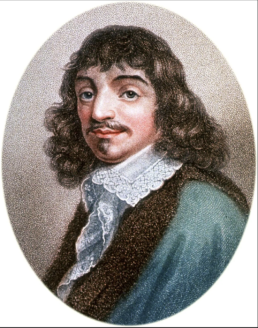These life stories may contain descriptions of childhood trauma and abuse, as well as images, voices and names of people now deceased. If you need help, you can find contact details for some relevant support services on our support page.
French philosopher, René Descartes, was in kinship care as a child.
René Descartes was born in 1596 into a well-off legal family, originally from the Poitou region of France. His father, Joachim Descartes, spent six months of the year 260 km away in Rennes at the Parliament of Brittany and was absent from home when René was born. Rene’s mother, Jeanne Brochard, gave birth to René at her mother’s home and died fourteen months later.
With his father absent for half the year, René, his brother, six-year-old Pierre, and sister, four-year-old Jeanne, were left in the care of his maternal grandmother and a wet-nurse. Biographer Desmond Clarke believes this arrangement continued for at least two years, and the children then moved between grandmother and father until René was four.
Joachim Descartes remarried in 1600 and moved permanently to Rennes. It appears René then lived with his grandmother until her death around 1609, after which René spent school holidays with his godfather, Michel Ferrand, or with his paternal grandmother.
Rene began his formal education at a Jesuit school, La Fleche College, 160 kilometres from home.
Apart from prescribed books, each boarder brought their own cutlery and a goblet. They also needed enough money to pay for the services of a tailor, and the hairdresser who visited the school twice a week to cut and powder their hair. The books alone were very expensive (Clarke).
René was at La Fleche from approximately 1607 until 1616, by which time he was nineteen years old.
René Descartes was persuaded – briefly – by his family to study law, but instead of practicing he became a ‘gentleman soldier’ in 1618 and moved to Breda in the Netherlands. Between 1619 and 1628 he traveled throughout Europe, during which time he invented analytic geometry and developed a method of deductive reasoning “based on mathematics, that is applicable to all the sciences.”
Descartes was also interested in esoteric knowledge and lived in many ways like a Rosicrucian. For example, he lived alone and changed his residence often, and he was optimistic that scientific knowledge could improve human life and increase longevity.
René Descartes went on to become one of the most influential philosophers of his time; he is sometimes regarded as the “parent of modern philosophy”.
A very telling indicator of Descartes’ continued relevance is the range of contemporary criticisms of him. Feminist philosophers frequently critique his arguments and influence, particularly his mind/body dualism… Philosophers and Cognitive Scientists who aim to reduce consciousness and all mental phenomena to physical processes often take issue with Descartes…[and] some philosophers seek to challenge the very notion of consciousness as self-reflection (Clarke).
References:
Clarke, Desmond. Descartes: A Biography. Cambridge University Press, 2005.
“Rene Descartes.” Stanford Encyclopedia of Philosophy, 2014. https://plato.stanford.edu/entries/descartes/
Watson, Richard. “Rene Descartes French Mathematician and Philosopher.” Encyclopaedia Britannica. https://www.britannica.com/biography/Rene-Descartes
Image available here.
